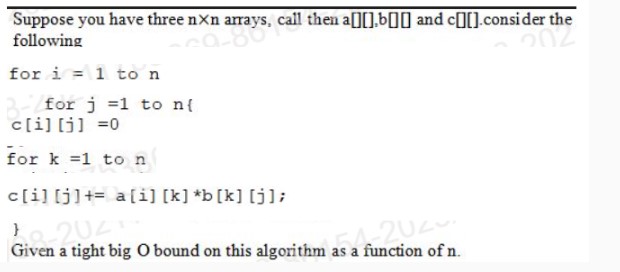QQuestionAnatomy and Physiology
QuestionAnatomy and Physiology
Suppose you have three 1$ arrays, call them a[][] b[][] and c[][] consider the following:
for i = 1 to n
for j = 1 to n{
c[i][j] = 0
for k = 1 to n
c[i][j] += a[i][k] * b[k][j];
Given a tight big O bound on this algorithm as a function of n.
Attachments

6 months agoReport content
Answer
Full Solution Locked
Sign in to view the complete step-by-step solution and unlock all study resources.
Step 1I'll solve this problem step by step, focusing on the time complexity analysis of the given matrix multiplication algorithm.
Step 2: Analyze the Nested Loop Structure
- Inner loop iterates over columns of a / rows of b ($$k = 1 \text{ to } n$$)
The algorithm consists of three nested loops:
Final Answer
Key Insights: - This is the standard matrix multiplication algorithm - Each element of the result matrix requires n multiplications and additions - The cubic time complexity makes this algorithm inefficient for large matrices
Need Help with Homework?
Stuck on a difficult problem? We've got you covered:
- Post your question or upload an image
- Get instant step-by-step solutions
- Learn from our AI and community of students